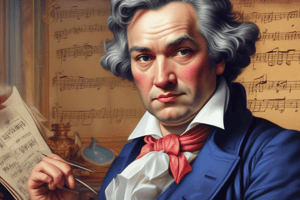Podcast
Questions and Answers
What unique characteristic is highlighted in Beethoven's late period compositions?
What unique characteristic is highlighted in Beethoven's late period compositions?
- Reliance on traditional orchestration
- Emphasis on simple melodies
- Use of counterpoint and fugue (correct)
- Strict adherence to Classical forms
Beethoven composed most of his famous works while he was physically healthy and thriving.
Beethoven composed most of his famous works while he was physically healthy and thriving.
False (B)
In what year did Beethoven pass away?
In what year did Beethoven pass away?
1827
Beethoven is recognized as a pivotal figure in the transition from _____ to Romantic music.
Beethoven is recognized as a pivotal figure in the transition from _____ to Romantic music.
Match Beethoven's contributions with their impact:
Match Beethoven's contributions with their impact:
What year was Ludwig van Beethoven born?
What year was Ludwig van Beethoven born?
Beethoven received a comprehensive formal education throughout his life.
Beethoven received a comprehensive formal education throughout his life.
Which prominent composers did Beethoven study with in Vienna?
Which prominent composers did Beethoven study with in Vienna?
Beethoven faced increasing _______ which impacted his performance career.
Beethoven faced increasing _______ which impacted his performance career.
What type of works characterized Beethoven's middle period?
What type of works characterized Beethoven's middle period?
Match the following periods of Beethoven's life with their significance:
Match the following periods of Beethoven's life with their significance:
What was Beethoven's father's profession?
What was Beethoven's father's profession?
What challenges did Beethoven face later in life?
What challenges did Beethoven face later in life?
Flashcards
Beethoven's Early Life
Beethoven's Early Life
Born in Bonn, Germany in 1770, Ludwig van Beethoven's father, a musician, was strict and pushed him into an intense music education.
Early Influences
Early Influences
From early childhood, Beethoven showed great talent and was influenced by the court musicians in Bonn, learning improvisation and composition.
Early Career in Bonn
Early Career in Bonn
Building on his talent and training, Beethoven achieved local recognition in Bonn by working as a court organist and teacher.
Moving to Vienna
Moving to Vienna
Signup and view all the flashcards
Vienna's Influence
Vienna's Influence
Signup and view all the flashcards
Beethoven's Creative Maturity
Beethoven's Creative Maturity
Signup and view all the flashcards
Challenges in Beethoven's Life
Challenges in Beethoven's Life
Signup and view all the flashcards
Beethoven's Legacy
Beethoven's Legacy
Signup and view all the flashcards
Beethoven's Late Period
Beethoven's Late Period
Signup and view all the flashcards
Counterpoint
Counterpoint
Signup and view all the flashcards
Fugue
Fugue
Signup and view all the flashcards
Classical to Romantic Transition
Classical to Romantic Transition
Signup and view all the flashcards
Study Notes
Early Life and Influences
- Ludwig van Beethoven was born in Bonn, Germany, in 1770.
- His father, a musician, was a harsh and demanding teacher.
- Beethoven received little formal education beyond the basics.
- Early exposure to music, starting from a young age.
- His musical talent was recognized early on and nurtured by his father.
- Significant influences in his early development included court musicians in Bonn.
- He showed a talent for improvisation and composition from an early age.
Bonn Years and Development
- Beethoven worked as a court organist and teacher in Bonn.
- He began to gain recognition in the local music scene.
- His move to Vienna was an important step in his career.
- He sought opportunities for advanced music study and performance.
- Bonn experiences provided a foundation for his later development.
- His early compositions display a burgeoning talent within the classical tradition.
Vienna and Rise to Fame
- Beethoven moved to Vienna, Austria in 1792.
- His arrival in Vienna marked the start of his most influential and productive period.
- He studied with Haydn and other prominent composers.
- Vienna's musical culture fostered his growing artistry.
- Beethoven quickly gained a reputation as a virtuoso pianist and composer.
- His initial success in Vienna was built on his performances.
- He attracted a loyal following of patrons and students.
- His compositional style emerged distinctively, initially drawing heavily on classical tradition.
Creative Maturity and Style
- Beethoven's creative output expanded in variety and scope.
- The middle period of his career is characterized by heroic and dramatic works.
- He experimented with form and expanded the role of the orchestra.
- Beethoven moved beyond the classical style, developing his characteristic themes and structures.
- His innovations in musical language had a profound impact on subsequent composers.
- Notable innovations include expanded orchestra size and development of new forms.
- This period included iconic compositions such as symphonies and sonatas.
Challenges and Personal Life
- Beethoven faced significant personal challenges.
- His health deteriorated over time.
- Increasing deafness impacted his performance career and social life.
- He found solace in his music, allowing his creativity to flourish despite these difficulties.
- His profound loneliness contributed to his difficult struggles
- Financial concerns periodically arose.
- Beethoven formed close relationships with several individuals, though these were frequently complicated.
Late Period and Legacy
- His compositional style matured into an intensely personal expression.
- The late period displayed greater experimentation with form and harmony.
- Unique characteristic of this period is the use of counterpoint and fugue.
- He continued composing despite increasing physical deterioration.
- His works during this period showcased a mature and profoundly personal artistic vision.
- The later works demonstrate advanced harmonic and structural innovation.
- His music significantly influenced subsequent generations of composers.
- Beethoven’s death occurred in 1827.
Impact and Influence
- Beethoven's music remains highly popular and influential today.
- His innovations in musical structure and expression laid the foundation for many 19th-century composers.
- His impact on the development of the symphony and sonata is profound and enduring.
- He transcended the typical composer role in his era.
- He challenged norms, particularly through his composition and public persona.
- Beethoven is recognized as a pivotal figure in the transition from Classical to Romantic music.
Studying That Suits You
Use AI to generate personalized quizzes and flashcards to suit your learning preferences.



